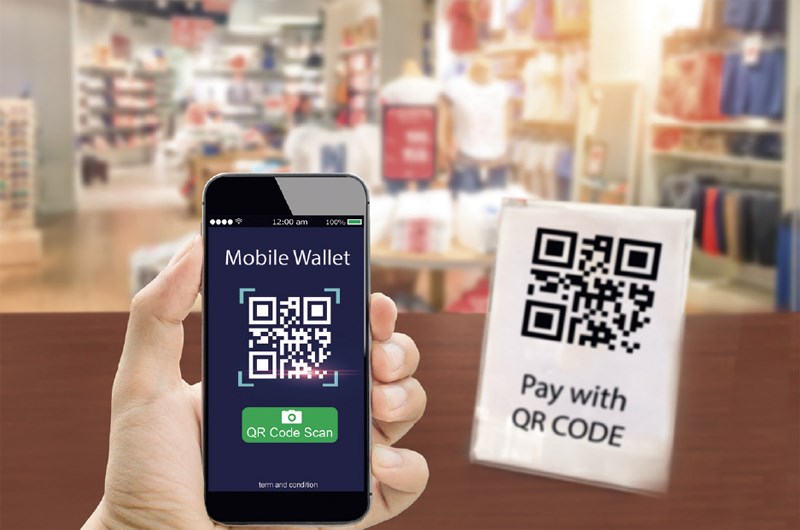Dialogue 1
Jingjing: Mark, you look chipper. Anything new?
京晶: 馬克,你看起來精神很抖擻呀,最近有何好事?
Mark: Not exactly. Work's been the same. I finally got my WeChat wallet working, though. That's been the highlight of my week.
馬克: 沒什么特別的,工作還是老樣子。不過,我終于啟用了微信錢包這個功能,這是我這周最開心的事情。
Jingjing: Were you living under a rock the last few years? Online payment's been around for a while now.
京晶: 難道過去幾年你一直生活在山洞里嗎? 在線支付已經存在很長一段時間了。
Mark: Don't I know it. I was starting to feel embarrassed, as the only one still paying with cash.
馬克: 我怎么會不知道呢? 我越來越覺得尷尬了,因為我是唯一一個還在用現金結賬的人。
Jingjing: So, what happened? Why are you on the bandwagon all of a sudden.
京晶: 那是發生了什么事,讓你突然就下定決心去追趕時代的步伐了?
Mark: Well, I was waiting to have a half day free—one that I wanted to spend at the bank. That didn't happen. Then people started putting money in my WeChat wallet. So: bye bye bank, hello online payment.
馬克: 我本來想騰出半天的空閑時間去銀行,但沒有實現。而且越來越多的人習慣通過微信錢包給我轉賬。所以:再見,銀行;你好,在線支付。
Jingjing: That's cool. I'm happy for you, Mark. It's a snap, isn't it?
京晶: 那很好呀,馬克,我很替你開心。在線支付很方便,不是嗎?
Mark: For sure. I don't have to worry about having small bills with me or having to break a hundred.
馬克: 確實。我再也不用為兜里攢著一堆小額鈔票或者100元破不開而發愁了。
Jingjing: Hmm. I got used to it gradually. But, for someone who has started to pay with their phone at a time when a phone could be used to pay for anything, would you say you spend more or less money every day?
京晶: 嗯。我是一點點習慣在線支付的。但是,對于你來說,在一個手機支付已經幾乎萬能的時代才剛剛開始啟用這個功能,你覺得你每天花的錢是多了還是少了呢?
Mark: I know what you're getting at. Because it doesn't feel like real money, I might make more impulse buys, right?
馬克: 我知道你的意思。你是說因為在線支付感覺不像真的在花錢,我可能會更多地沖動購物,對吧?
Jingjing: Yeah. Do you buy more junk food and sweet drinks?
京晶: 是的。你會買更多的垃圾食品和甜飲料嗎?
Mark: At my university, there's a vending machine that makes fresh-ground coffee. I tried that, once. But I get the same weekly allowance from my wife every week. And I know that'd be gone pretty quickly if I bought snacks.
馬克: 在我工作的大學里,有一臺自動販賣機出售現磨咖啡,但我只買過一次。因為我每周從我太太那里得到的零用錢是固定的,我知道如果我買零食的話,這些錢很快就會花光的。
Jingjing: Well, then, it sounds like you have at least some self-control.
京晶: 這么聽起來你還是有點自制力的嘛。
Mark: Ha ha. Right, some.
馬克: 哈哈,是的,有一點。
New words : 習語短語
a snap 簡易便捷的事物
something convenient, quick and easy
to break (a hundred) 破開(百元鈔)
use a 100yuan bill to pay for something small and get lots of change
what you're getting at 你的意圖,所指
what you're suggesting
an impulse buy 沖動消費
something you buy without thinking carefully
a vending machine 自動售賣機
a machine that sells snacks and drinks

Dialogue 2
Jingjing: So, Mark, now that you've caught up with the times, do you have any ideas about the future of online payment?
京晶: 馬克,既然你現在已經跟上了時代的步伐,你對在線支付的未來有什么看法嗎?
Mark: Yeah. Facial recognition is being used already by police. The technology could easily be applied to POS.
馬克: 現在警方都已經在使用面部識別技術了,我覺得這項技術應該可以很容易地應用在收銀處。
Jingjing: That'd be a little weird. Imagine, at the supermarket, you'd just look up at something like a camera as you leave.
京晶: 這想法有點奇怪。想象一下,當你離開超市的時候,只需要抬頭看看一臺像相機一樣的東西。
Mark: Exactly! You wouldn't even have to put your stuff down on a counter. Just push the cart out of the store, and everything would get scanned.
馬克: 就是這樣! 你甚至不用把東西一一放在柜臺上,只要把購物車推出商店,所有的東西就會自動被掃描。
Jingjing: I guess the merchandise would all have to be tagged with special electronic chips.
京晶: 那估計所有的商品都必須貼上特殊的電子芯片。
Mark: Yeah, those are pretty cheap nowadays. And they might be something people could recycle, like bottle caps.
馬克: 嗯,那東西現在成本已經很低了。而且以后它們很可能會被回收利用,就像瓶蓋一樣。
Jingjing: Do you think online payment is safe?
京晶: 你覺得網上支付安全嗎?
Mark: Well, people keep their nest egg separate from their mad money and weekly budget.
馬克: 挺安全的吧,畢竟人們都會把積蓄和娛樂零花錢、日常開銷分開來儲存
Jingjing: What about hackers?
京晶: 那黑客呢?
Mark: Smartphone technology will have to get better and better. Meanwhile, the biggest danger is probably people misreading price tags, and walking out of the store with a 1000yuan bottle of wine that they thought cost 100.
馬克: 智能手機技術肯定會發展得越來越好的。目前最大的危險很可能是人們會誤讀價格標簽,拿著一瓶1000元的紅酒走出商店,還以為只賣100。
Jingjing: Ha ha. Oops!
京晶: 哈哈。那可尷尬了!
Mark: Oops is right. I've caught mistakes like that at the check stand. For now, at least, I'm more careful to check prices and read totals before clicking the “pay now” button.
馬克: 確實很尷尬。我在收銀臺就犯過類似的錯誤。至少我現在在點擊“支付”按鈕之前,會更仔細地檢查單價和支付總額。
Jingjing: Ok then. Let's hope you don't make any major mistakes and run out of your allowance!
京晶: 好吧。希望你不要犯什么大錯誤,把你的零用錢花光光!
Mark: I know, right! I'm down to my last 100 and the week isn't over yet!
馬克: 可不是么! 這周還沒結束呢,我的零花錢只剩100塊了!
Jingjing: I'll buy you a cup of coffee. How about that?
京晶: 那我請你喝杯咖啡,怎么樣?
Mark: Thanks, Jingjing!
馬克: 謝謝你,京晶!
New words : 習語短語
catch up with the times 趕上時代潮流
start to do something modern
facial recognition (technology) 人臉識別技術
computer equipment to recognize someone by their face
POS 銷售終端
point-of-sale (pronounced pee ooh ess) - a checkout counter, cash register, etc
merchandise 商品
stuff for sale in a store
nest egg 備用的錢,儲備金
a person's savings and investments
mad money 較為隨意支配的花費
the money a person allows themselves to spend on small fun stuff (spend madly)
weekly budget 每周日常預算
money for food, transportation, etc
hackers 黑客
people who steal electronic information











